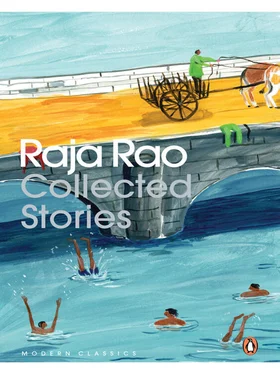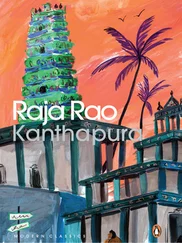Raja Rao - Collected Stories
Здесь есть возможность читать онлайн «Raja Rao - Collected Stories» весь текст электронной книги совершенно бесплатно (целиком полную версию без сокращений). В некоторых случаях можно слушать аудио, скачать через торрент в формате fb2 и присутствует краткое содержание. Год выпуска: 2014, Издательство: Penguin, Жанр: Классическая проза, на английском языке. Описание произведения, (предисловие) а так же отзывы посетителей доступны на портале библиотеки ЛибКат.
- Название:Collected Stories
- Автор:
- Издательство:Penguin
- Жанр:
- Год:2014
- ISBN:нет данных
- Рейтинг книги:5 / 5. Голосов: 1
-
Избранное:Добавить в избранное
- Отзывы:
-
Ваша оценка:
- 100
- 1
- 2
- 3
- 4
- 5
Collected Stories: краткое содержание, описание и аннотация
Предлагаем к чтению аннотацию, описание, краткое содержание или предисловие (зависит от того, что написал сам автор книги «Collected Stories»). Если вы не нашли необходимую информацию о книге — напишите в комментариях, мы постараемся отыскать её.
Collected Stories — читать онлайн бесплатно полную книгу (весь текст) целиком
Ниже представлен текст книги, разбитый по страницам. Система сохранения места последней прочитанной страницы, позволяет с удобством читать онлайн бесплатно книгу «Collected Stories», без необходимости каждый раз заново искать на чём Вы остановились. Поставьте закладку, и сможете в любой момент перейти на страницу, на которой закончили чтение.
Интервал:
Закладка:
But Bhedia was, if you want to know, one of the great men in Benares. He never scorned. He never spat on anyone. He felt he was a saint ‘Why sir,’ he would say, ‘in the kingdom of Indra deep in Heaven,’ and he would point at the sky, ‘there’s a lake called the lake of Vishada. There, there are many mermaids and each one more beautiful than the other. I used to go up there betimes when my master slept in the afternoon: mills and back, and drink, and lunch. And thus,’ Bhedia would show the palm of his hand, and lay his head on it, ‘Master Krishna Prakash used to sleep up till three or four. Meanwhile I would whisk the flies off my horses and take a trip to Indra’s Kingdom. The difference between the two is simple. Here train runs, there cities move. You don’t go to a city. The city comes to you. You think, and it is there! “Palace,” you shout and you are in a bright lit palace, with marble halls — and, what shall I say, even woman guards, and fierce cockfights. What’s the use of a palace without a cockfight? Once upon a time I used to own cocks and fought them till they bled. One of them, Chilla, was like a buffoon. He played tricks with everyone, and when he struck it was like a thunderbolt, it killed every other cock. That’s why I am so happy in Benares, do you hear, sir? The river goes where it willeth, the crows caw, they caw, caw! Dancing girls become saints in this city, Maharajas wash the feet of Sadhus, and your Bhedia is here because one day his master got so angry. “Hé, you idiot”, he cried from the porch of the bungalow (and that was in Lucknow, and he was a rich man and a big man), “hé, Bhedia you idiot, and you haven’t even learnt to make my bedding roll, you a thousand times idiot, a million times idiot!” and sir, he gave me such a kick, here, just on my man’s big little titbit, I just rolled and rolled on the floor squealing like a panicked cur, and praying to Shivji: “Take me away, Lord, and make me anything but make me a good servant.” A good servant sir,’ and here Bhedia adds some more chillum into his smoke, ‘a good servant is like a good swing. It knows exactly where to go and when to come. A good servant is like nobody. A good servant is like a big jackfruit, like a saint, like a wide-eared elephant. It’s no use being a bad servant, sir, it’s unpleasing unto God. God did not make man to be bad, it is like a monkey that apes man. Better be a monkey, I said to myself, sir, and came to the holy city of Benares. But I cannot climb trees. I can steal fruits all right,’ and here from the folds of his dhoti Bhedia would produce all sorts of curious finds: dirty newspapers, beedies, sacred threads, nails, toothbrush of neem-twigs — he would produce babies’ caps, a woman’s cholipiece with lovely peacock designs, mango-stones, a gold ring, and some squashed coconut bits, two buttons, and an orange. ‘Hé,’ he giggled, ‘don’t you think I steal better than they?’ and he looked up and laughed at the monkeys. ‘Life is easier for me than for them. I hate calling them by their real name. They understand man’s language and one day or the other they take revenge. So I was saying, I am a man, therefore, I walk on foot. They have to crawl on all their limbs. A man trusts man. A man does not trust a four-legged thief. Two legs are right. And you steal and you run just like this. Hé,’ and he shouts. But the whole lane laughs. Who does not know Bhedia, our younger brother? So noble, so heart-clean, friend to all creatures and stones, and look here, he takes a stone out of his pocket and throws it at the dustbin crows, and—‘and — and,’ he could find no words, so Bhedia looks up at you and laughs.
He is so lovable, is Bhedia, you would have to create him like Brahma himself if he did not be. For him all things are so real, so simple, and he can play a cat against the moon and the earth against Indra’s kingdom, and yet he would not harm a chameleon. Chameleons change colour and so are evil. That’s why Muslims kill them — he, the brute, the betrayer. For Bhedia there is no betrayal. In Benares all is right. Shivji in the temple will make him a good servant, one day. The fact is, there is no sadhu however full of ire and tong-tonguing who does not pat him on the back ‘Hé Bhedia, what’s the news from Heaven?’ they ask. ‘It’s cold,’ shouts Bhedia turning on himself with chill shivering. ‘The sun has forgotten Indra’s Heaven. And so it is chill like on the snows. When you have too much cold,’ says Bhedia, ‘you become like the Man of the Snows.’ Some eager Europeans even come to Bhedia led by an overeager guide. ‘This man, sir, has seen seven Snow Men. He comes from their country. How are they, Bhedia?’ Bhedia answers something in Hindi, and the guide gives the apt answers. ‘The Snow Men are tall. They are all white like the Europeans. The Snow Man eats only snow. One was even seen mating on the lake sides. The little ones are already big as a pony, etc.’ The Benares guides have such greed and a great imagination. I tell you, you cannot live in Benares if you have no imagination which explains why Bhedia is so happy here For him the world is imaginationings. To live in one’s imagination is truly to live in heaven, has said some village vulgar singer, has he not? But that’s the truth of the matter. There is no better representative of man than Bhedia. Unless you think of Shalwar Khan.
Now Shalwar Khan, also a friend of Bhedia’s, is just a different type of horse — it has five legs. You must understand what Bhedia means by this. A four-legged horse runs just like that, like those tied to an ekka. But with Shalwar Khan they ran in any direction you like: back or forth. They can go forward going backwards or go upwards going downwards. For Shalwar Khan can grow mangoes where there’s only a foot-high plant, he can play magic with his cobra, his loved one, his beloved one, his noble friend, his destiny, his God’s companion; he can make his son, Putli, dance on earth, and then high up in heaven. Shalwar Khan can lay his travelling bundle under a neem or tamarind tree, spread his cloth at any cross-lane, and then plant his magic-pole into the earth, shake his drum-drum and all the neighbourhood is suddenly awake: the children, as if woken from a dream, come lisping and tumbling, holding their aunt’s hands, their maid’s fingers, and the boys make a huge circle for the marvels to see. Putli loves to be a hero among boys, Putli’s mother was forgotten on some riverbank — she loved drink too much, and loved ghosts more than man, and Shalwar Khan’s gods hated ghosts. So he abandoned his wife one day and ran off with Putli — he got into a train — his huge travelling bundle, his snake basket, and his oboe, and was he not successful in the train? Though at every other station he was thrown out by the ticket-collector, he and his son, Putli, then four years old. Finally he came to Shiva’s mighty city (Shalwar Khan’s gods had some minor links with Shiva’s minions — did they not?) and once you come to Benares how can you ever leave it? Tell me.
‘Hé, bolo,’ he would start, and all the housewives would lean over the windows, with their washings, their ladles, or their combs in hand, they too would watch the show while the children are already down by the tamarind tree. ‘In the time of Rama,’ Shalwar Khan would start shaking his drum and say, ‘there was a cow and her name was Ma-Moo.’ ‘Yes, Ma-Moo,’ repeats Putli. ‘And Ma-Moo was always of bad temper, like a shrew.’ ‘Like a shrew,’ repeats Putli. ‘Give me my shrew.’ And now Shalwar Khan takes out his oboe, and as he begins to play over the serpent-box he says: ‘Hé Lord, you must rise, and adorn our court. What do you say to that?’
‘Hé, Lord, I am here,’ says Putli, to the cobra whose hiss is now heard all around. And Bhedia who’s joined the crowd says: ‘O children, take care, go away, and stand at a distance, the great King of Serpents is there. Take care, his skin is gold, his eyes diamond, and his heart is that of a saint.’ ‘Of a saint,’ says Putli as if all these were known forever. ‘Hé, Bhedia,” shouts Shalwar, ‘come and sit with me here, and help me. You can lift the lid so that the great Prince may appear.’ Bhedia without a shake of fear goes straight and lifts the box-lid off, and there is our beautiful Naga, Lord, King, spreading his hood, and playful as play. He slips and whirls, quivering out his tongue with thirst as though music is what he lives on. Bhedia goes round and round the box whispering something to himself, fully fascinated. And then Putli tells the story.
Читать дальшеИнтервал:
Закладка:
Похожие книги на «Collected Stories»
Представляем Вашему вниманию похожие книги на «Collected Stories» списком для выбора. Мы отобрали схожую по названию и смыслу литературу в надежде предоставить читателям больше вариантов отыскать новые, интересные, ещё непрочитанные произведения.
Обсуждение, отзывы о книге «Collected Stories» и просто собственные мнения читателей. Оставьте ваши комментарии, напишите, что Вы думаете о произведении, его смысле или главных героях. Укажите что конкретно понравилось, а что нет, и почему Вы так считаете.












